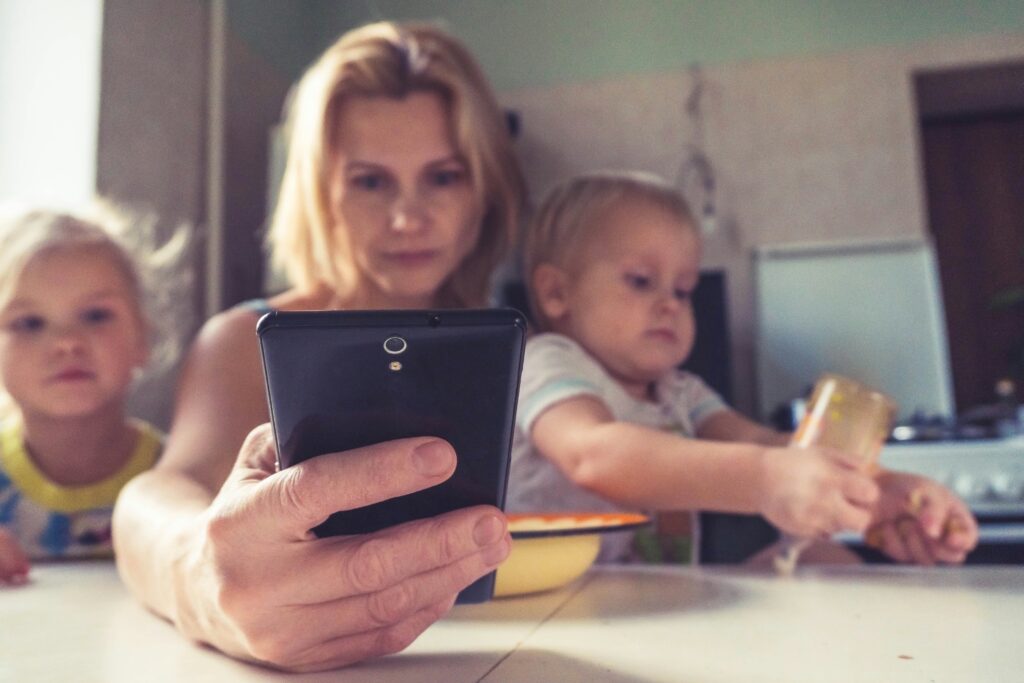How we discuss meals and our bodies with our youngsters can have a major influence on their self-perception and relationship with consuming. Via these conversations, we can assist assist youngsters in having a balanced relationship with meals and their our bodies.
Consuming issues are advanced psychological sicknesses that have an effect on one’s consuming behaviors, they usually can have an effect on individuals of all ages. Some consuming issues are characterised by a drive to vary how one appears resulting from a distorted physique picture. Physique picture refers to how we understand, assume, and really feel about our our bodies. It might probably embody our beliefs about our look, how we really feel in our personal pores and skin, and the way we expect others view us.
By speaking to youngsters about meals and physique picture, we are able to promote self-acceptance, change the main focus away from look, and create an atmosphere the place youngsters really feel secure to precise their issues.

An Uphill Battle
In our society, we’re surrounded by fixed scrutiny on our consuming behaviors and physique measurement. It’s a tradition that tells female-identifying people they should continually enhance their appears and check out the brand new weight reduction pattern or food regimen, but concurrently criticizes them for being “too horny.” It’s a tradition that tells male-identifying people they should look extra masculine, larger, and leaner. It’s a tradition that doesn’t absolutely settle for trans our bodies and nonbinary identities. It’s a tradition that disproportionately oppresses Black and Brown our bodies for wanting totally different, whereas those self same racial inequalities create meals deserts that restrict entry to wholesome and reasonably priced meals choices.
This tradition could make it tough to navigate {our relationships} with our our bodies as adults. It might probably really feel scary or disheartening to know the youngsters in our lives are uncovered to the identical pressures. Nonetheless, it’s additionally a chance: an opportunity to shift the narrative about meals and our bodies. As an alternative of hiding the problem or battle, we are able to discuss it overtly and observe new methods of interacting with meals and physique picture.
Be Alert to Physique Picture Considerations
All through this weblog, we’ll principally concentrate on proactive tricks to discuss to your youngsters. Nevertheless it’s additionally essential to be looking out for indicators of misery. It’s regular for kids to be interested by their our bodies, however it’s essential to pay attention to when this curiosity turns into intense, obsessive, or essential. These patterns can doubtlessly result in disordered consuming behaviors, consuming issues, or different psychological well being circumstances. Listed below are some indicators to observe for:
- Speaking Negatively About Their Our bodies: If a baby continuously makes destructive feedback about their look, it may be a pink flag. Take note of statements that mirror dissatisfaction or self-criticism about their physique.
- Evaluating Their Our bodies to Others: Kids who continually examine their our bodies to their friends or to photographs they see within the media could also be fighting physique picture points. This comparability can result in emotions of inadequacy and low vanity.
- Avoiding Actions: Discover if a baby avoids a bodily exercise as a result of they assume their physique received’t be capable to deal with it or as a result of they don’t need others watching them. This avoidance generally is a signal of underlying physique picture issues.
- Expressing Guilt Round Meals: Be alert if a baby expresses guilt about consuming sure meals, avoids favourite meals, or talks about weight-reduction plan. These behaviors can point out an unhealthy relationship with meals and a preoccupation with physique weight or form.
Recognizing these indicators early can assist caregivers intervene and assist youngsters in creating a optimistic physique picture and relationship with meals.
Saying it Immediately: Acknowledging the Challenges of Physique Picture
We all know you wish to hold your baby’s world crammed with sunshine and rainbows, however ignoring the challenges of physique picture is commonly not useful. Addressing these points immediately can validate the experiences younger individuals have and supply them with instruments to navigate the world extra confidently.
Break Down the Myths:
Kids and adolescents are continually absorbing cultural messages about physique norms and what the “excellent physique” appears like, usually with out realizing it. By immediately acknowledging that tradition desires to regulate what our bodies ought to seem like, we can assist them perceive that these norms are unrealistic and sometimes dangerous. Encourage the assumption that our bodies shouldn’t be excellent; they need to be distinctive to every individual. Have fun range in physique styles and sizes, emphasizing that all our bodies are good our bodies.
Addressing Social Media
Don’t ignore what youngsters is likely to be seeing on social media. It’s a robust affect that may form their perceptions of magnificence and physique picture. As an alternative of avoiding the subject, have interaction with them about what they’re viewing. Talk about the truth behind curated pictures, filters, and modifying. Assist them perceive that what they see on-line is commonly not a real reflection of actual life. This doesn’t at all times need to be a severe dialog, however it’s essential to create an open dialogue the place they really feel comfy sharing their ideas and emotions.
Ideas for Speaking About Critical Subjects with Kids:
- Be Trustworthy and Age-Applicable: Use language and ideas that match their stage of understanding.
- Hear Actively: Encourage them to share their ideas and emotions with out judgment.
- Validate Their Emotions: Allow them to realize it’s okay to really feel confused, upset, or annoyed about these matters.
- Use Examples: Share relatable tales or eventualities from what you’ve skilled. Being a bit weak concerning the pressures round meals and their bodily look can assist youngsters really feel like their experiences are regular.
- Keep Constructive: Reinforce optimistic messages about self-worth and physique acceptance.
By immediately acknowledging the challenges of physique picture and fostering a optimistic or impartial relationship with meals, caregivers and relations can assist youngsters navigate these advanced points with confidence.

Dialogue Across the Dinner Desk
Kids are rising, and getting a balanced and nutritious food regimen is extremely essential (simply as it’s for adults too!). One solution to nurture a much less charged relationship with meals is to take the judgment out of it.
Encourage intuitive consuming, which suggests taking note of your physique’s cues round starvation and satiation. Whereas that is simpler mentioned than carried out, it may be taught or reasonably, retaught. Apparently, all of us begin with intuitive consuming. Infants eat after they’re hungry and cease after they’re full. It’s solely when youngsters begin studying cultural and grownup methods of consuming that they transfer away from this intuitive framework.
We perceive that schedules are essential and there are causes for becoming meals right into a routine. Nonetheless, what’s essential is that the physique’s alerts ought to take priority over these schedules. If a baby is hungry exterior of mealtimes, supply a snack! In the event that they aren’t that hungry throughout mealtime, there’s no disgrace in that both.
By modeling a optimistic relationship with meals and selling intuitive consuming, caregivers can assist youngsters develop a more healthy method to consuming and physique picture. This shift can result in a extra balanced and fewer anxious interplay with meals.
The Significance of Modeling
Having open conversations about meals and physique picture is essential, however it’s simply as essential to guide by instance. Present the behaviors you hope your youngsters will undertake by working towards them your self. Your actions communicate volumes and might have a profound influence on how your youngsters understand and deal with their very own our bodies
Younger youngsters are considerably influenced by what they see on the planet round them, together with social media and different exterior sources. Nonetheless, they’re maybe most affected by the direct individuals of their lives. If youngsters observe their mother and father or caregivers weight-reduction plan and talking negatively about their very own our bodies, they’re more likely to imitate these insecurities.
Conversely, the other can be true: when a baby sees their mother and father or caregivers displaying love and style for his or her our bodies, they’ll internalize these extra body-positive messages. Embrace your place as a job mannequin by demonstrating a healthful relationship with meals and physique picture.

Empathize with the Challenges
Modeling physique positivity or neutrality and fostering a wholesome relationship with meals received’t at all times be simple, and also you received’t be capable to seize each alternative for a productive dialogue along with your baby. As mother and father, caregivers, academics, and others concerned in youngsters’s lives, you’ll make errors. Nonetheless, a very powerful half is to empathize and be sincere.
Find out how to Reply to a Little one Who Brings Up Physique Insecurities
When a baby brings up issues about consuming or their physique, take a second to acknowledge the importance of this act. It’s an enormous show of belief for a kid to share one thing weak with you. Efficient and empathetic listening is essential right here.
- Acknowledge Their Emotions: Let the kid know that their emotions are legitimate. Acknowledge that these challenges are actual and that it’s okay to really feel this manner.
- Share Your Personal Experiences: If acceptable, share a private story about the way you’ve struggled with physique dissatisfaction or a destructive physique picture. This helps normalize their emotions and reveals them that they don’t seem to be alone.
- Supply Reassurance and Help: Reinforce that they’re cherished and valued simply the best way they’re. Emphasize the significance of well being and well-being over look.
- Encourage Open Dialogue: Create a secure area for ongoing conversations. Allow them to know they will at all times come to you with their issues.
Empathizing with youngsters’s challenges and responding with honesty and assist can assist them really feel understood and fewer alone of their struggles. This method not solely strengthens your bond with them but in addition empowers them to navigate these points with resilience.
Discover Help with The Alliance
Speaking to youngsters about meals and physique picture is crucial in serving to them develop a wholesome relationship with their our bodies and with consuming. By addressing these matters immediately, modeling optimistic behaviors, and displaying empathy, you may empower your youngsters to navigate the advanced cultural messages they encounter on daily basis. Bear in mind, it’s okay to make errors alongside the best way—what issues most is your dedication to creating an open and supportive atmosphere.
For those who discover it difficult to deal with these conversations alone, it could be useful to contain an expert. The Alliance is a helpful useful resource for locating pediatric suppliers in your space who focus on these points. When you’ve got issues about your baby’s physique picture, don’t hesitate to name the helpline to talk with a licensed psychological well being skilled. They’ll supply steerage and assist to make sure your baby receives the assistance they want and deserve.

